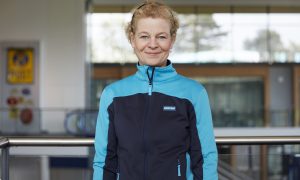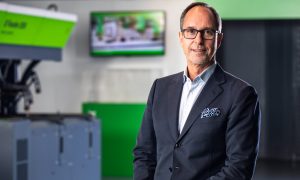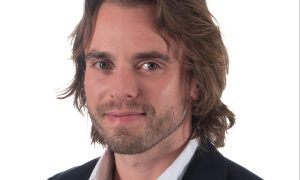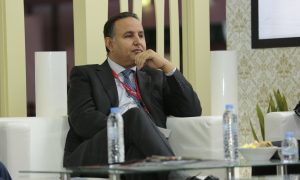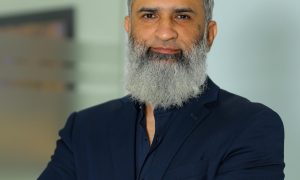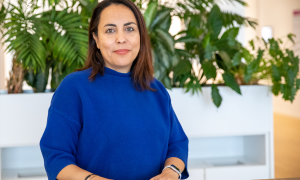In the Netherlands, 1.5 million mattresses are discarded every year. If you piled those 1.5 million mattresses on top of each other, you’d create a tower that is 1000 times the height of Paris’ Eiffel Tower. Now, imagine that same pile of mattresses on a European scale, with 35 million mattresses sold annually.
“All these mattresses used to be thrown into the incinerator, they were burned. You can imagine the Co2 emissions and the impact on the environment of this.” It’s a startling image and shocking statistic that Jan-Joost Bosman, CEO of Royal Auping, shares. What is equally startling is his deep and genuine concern for the global effects of the mattress products Royal Auping produces. This is not a CEO paying lip service to the environmental impacts of his business. Jan-Joost has gone as far as creating a business model out of solving the problems his products create for the planet. He is strident in his views on sustainability, and unapologetic about the environmental responsibilities that he believes, sit squarely with industry.
Businesses have to take responsibility for the things they’re putting into the market.
“I really believe that if you don’t think carefully when you are developing products, about what happens to the product once it has been discarded, your business model is a dead end. You have to take responsibility,” he says.
Royal Auping is a company with a heart and a conscience. As the largest independent bed manufacturer in the Benelux, it has been in business for over 130 years, when Johannes Albertus Auping developed his first mesh bed with a springy, ventilated base under the mattress.
Jan-Joost began working at Royal Auping after more than a decade working for the global cosmetics company L’Oréal. He spent 11 years in various marketing and sales jobs, as well as managing business units amongst others in Latvia, an experience that set him up for success at Royal Auping. “Working within such an established, multinational, marketing and sales-driven company, I learned how to position a brand and a company on the one hand, and on the other hand, I really learned how to financially steer a company.”
He credits his time at the L’Oréal Riga office with rounding out his entrepreneurial skills. He says, “There was a kind of blank page, to do what I wanted to do to change and improve the structure, and that’s what I did.”
Moving then to Royal Auping, Jan- Joost saw all of his previous experience coming together: “We have a research team, an innovation team, product development, we also have a factory. We have a strong marketing department and of course a successful sales department. We have our own offices across Europe in four countries, and our own logistics system on trucks, on drivers. So, we have everything to run a business under our roof.”
Jan-Joost is very much a leader of the future. He exhibits a highly aware, global viewpoint in his conversation and energetically discusses how his drivers are not just typical commercial goals of most businesses, but also a desire to legitimately make the world a better place. It’s no surprise to hear, that after starting with Royal Auping in 2016 as Dutch market director, he was appointed to CEO just one year later.
Royal Auping has fast gained a reputation as a market leader, largely by being the first and only mattress company to close the loop on mattress manufacturing. They partner with a company called Naiga, a group of “re-designers” with a non-negotiable product design philosophy, to make products healthier and fully recyclable. Together, the two companies have developed the world’s first circular mattress, under the evolution of the sleep brand, Auping Evolve.
Jan-Joost shares: “We are making our business operations model sustainable and circular. We are about to launch a full range of circular mattresses in all our countries where we are active. Half of our turnover consists of producing and selling mattresses. And to change this mix from conventional foam mattresses to 90% full circular mattresses is a big thing for us. So much remains to be done in the sleep industry to produce responsibly. Having developed and launched the first circular mattress in the world, Auping is at the forefront of transforming from linear to circular production. Most of our competition is just at the very start trying to put some strategy together. They are not driven by a true conviction to change the world, but by a need to do so within their marketing mix. In this respect, Royal Auping achieved B Corp certification already in April 2020, as the very first manufacturer of mattresses, beds, and box springs to join this community. This is a very strong validation of our intrinsic belief that a solid and well embedded corporate social responsibility consciousness is at the heart of everything we at Royal Auping. Already for years.”
Jan-Joost explains the impacts to the mattress industry by shifting to circular products. As he talks, the scale of the environmental impact becomes clear. “Our research shows that we can reuse the same mattress materials between six to eight times. So that means if, if you keep your mattress for 10 years, you can now have the same raw materials renewed eight times, giving you 80 years, almost a lifetime, to sleep on the same mattress with the same material.”
He is quick to point out that the mattress is never second-hand, but the original mattress raw materials go back to the suppliers to be granulated back to fibres. These new fibres are then used to make new yarns and those new yarns are used to make a new mattress. “This means, as a consumer, you can take real responsibility in limiting your Co2 footprint.”
The concept is exciting, and the company’s focus on achieving this kind of sustainable manufacturing is admirable. As a family-owned business, Royal Auping is obviously not a business in a vacuum. They are conscious of their place in the industry, and the world, and look for opportunities to make a lasting contribution to the industry at large.
“We are also offering the concept of building and producing a circular mattress to competing brands and manufacturing brands in our industry internationally. We’re also offering it to retailers that we are willing to work with us, based upon our philosophy of building a kind of alliance, if you like, to make a change in the whole industry. To minimise our Co2 footprint as an industry and to take true responsibility.”
Not only is Royal Auping environmentally conscious, but they are socially conscious too, deeply connected with their head office community, and active in creating opportunities to positively impact their region. “ We produce locally, here in Deventer in the Netherlands. Our goal is to source our raw materials or supply chain materials, within an area of 300 km from the factory. Some elements are not there yet. For aluminum, we buy from Spain and wood comes partly from Romania. But we do as much as we can”
It was perhaps through the Covid-19 pandemic that Royal Auping displayed the depths of social contribution when at the height of the crisis, they became makers of FFP2 facemasks for the Dutch government.
“We heard that there was a big shortage in all kinds of PPE materials for healthcare personnel. We were very quick to say, you know, we are good at using sewing machines. We have skilled workers; we have textiles and materials for mattresses. Why can’t we use our labor force to produce facemasks to protect healthcare workers?”
And so, within just a few weeks, the Auping had set up, in close collaboration with a few other local companies, a separate space in its factory where they rented 10 sewing machine stations, trained their staff, and began producing masks by hand.
While this PPE assistance started as a local initiative helping hospitals near to their factory, the size of the equipment shortage across the country soon saw Royal Auping engaging with the Dutch government and being selected as one of only two companies producing certified masks for healthcare nationally.
Certainly, Royal Auping has achieved much in recent years despite the pandemic. It’s hard to imagine any future goals that could beat the innovation they have already achieved. But in a truly dynamic fashion, Jan-Joost has more lofty goals in his sights.
“The main thing for us is to really succeed in making the mattress transition into circular products. That is very clear. The next step is to find circular solutions for beds and then box springs. And whilst changing our products to fully circular, we will continue to further invest in making our factory even more sustainable. And at the end of the day, possibly climate neutral.”
And then he adds, “and of course, you know, there’s profitability. We must remain profitable and invest in our key strategic pillars in order to compete.” He laughs, “after all, we cannot die just being beautiful as a company.” With Jan-Joost at the helm, I don’t think that will be a problem for Royal Auping.
Click here to read & download the full article.


